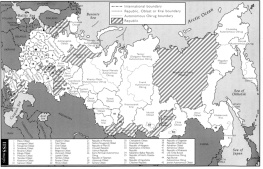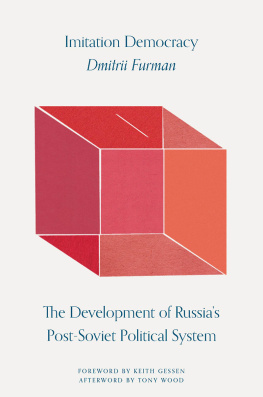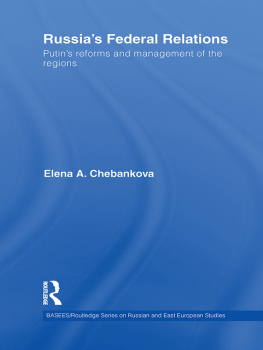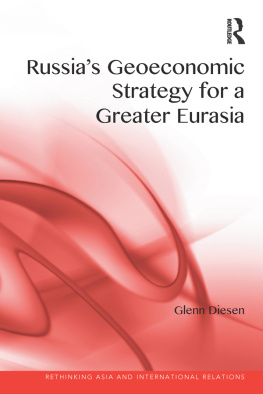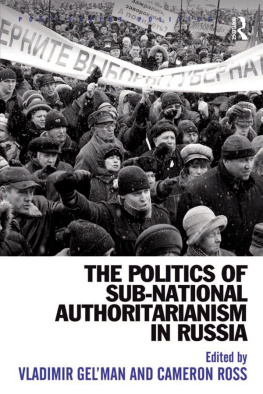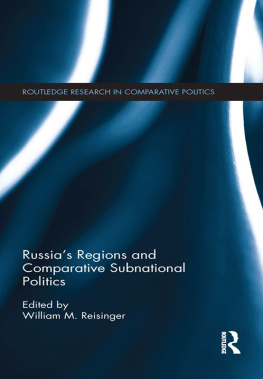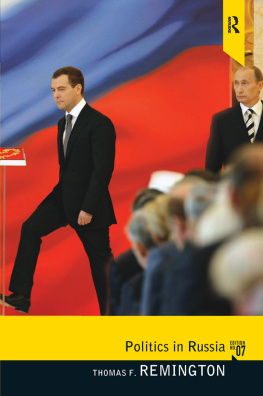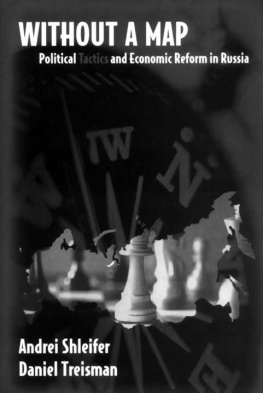Martin Nicholson
Towards a Russia of the Regions
Adelphi Paper
Oxford University Press, Great Clarendon Street, Oxford Ox2 6DP
Oxford New York
Athens Auckland Bangkok Bombay Calcutta Cape Town
Dares Salaam Delhi Florence Hong Kong Istanbul Karachi
Kuala Lumpur Madras Madrid Melbourne Mexico City
Nairobi Paris Singapore Taipei Tokyo Toronto
and associated companies in
Berlin Ibadan
Oxford is a trade mark of Oxford University Press
Published in the United States
by Oxford University Press Inc., New York
The International Institute for Strategic Studies 1999
First published September 1999 by Oxford University Press for
The International Institute for Strategic Studies
23 Tavistock Street, London WC2E 7NQ
Director John Chipman
Editor Gerald Segal
Assistant Editor Matthew Foley
Project Manager, Design and Production Mark Taylor
All rights reserved. No part of this publication may be reproduced, stored in a retrieval system or transmitted in any form or by any means, electronic, mechanical or photo-copying, recording or otherwise, without the prior permission of The International Institute for Strategic Studies. Within the UK, exceptions are allowed in respect of any fair dealing for the purpose of research or private study, or criticism or review, as permitted under the Copyright, Designs and Patents Act, 1988, or in the case of reprographic reproduction in accordance with the terms of the licences issued by the Copyright Licensing Agency. Enquiries concerning reproduction outside these terms and in other countries should be sent c/o Permissions, Journals Department, Oxford University Press, Great Clarendon Street, Oxford, OX2 6DP, UK.
This book is sold subject to the condition that it shall not, by way of trade or otherwise, be lent, re-sold, hired out or otherwise circulated without the publishers prior consent in any form of binding or cover other than that in which it is published and without a similar condition including this condition being imposed on the subsequent purchaser.
British Library Cataloguing in Publication Data
Data available
Library of Congress Cataloguing in Publication Data
ISBN 0-19-922474-9
ISSN 0567-932X
contents
maps & tables
Map 1
The Components of the Russian Federation
Figure 1
The Structure of the Russian State
Table 1
Russia s Prosperity, by Region
Table 2
Division of Tax Revenues, 1998
Table 3
Russias New Frontier Regions
Map 2
The North Caucasus
Map 3
The Russian Far East
Map 4
The North West
Map 5
Kaliningrad
CISCommonwealth of Independent StatesCFEConventional Armed Forces in EuropeCPRFCommunist Party of the Russian FederationCWCChemical Weapons ConventionEUEuropean UnionFSBFederal Security ServiceGDPgross domestic productGKIFederal State Property CommitteeLDPRLiberal Democratic Party of RussiaNDROur Home is RussiaOECDOrganisation for Economic Cooperation and DevelopmentOSCEOrganisation for Security and Cooperation in EuropePSAproduction-sharing agreementSEZSpecial Economic ZoneUNDPUN Development ProgrammeVATvalue-added taxVGTRKAll-Russian Broadcasting CompanyWMDweapons of mass destruction
Since the collapse of the Soviet Union in 1991, Russias state system has been transformed, but the question of how the country should be governed, or indeed whether it is governable at all, remains unanswered. Russias federal system has evolved through a series of compromises between central government and regional administrations. The constitutional framework is weak and inherently flawed; the balance of political and economic power, while tilting towards the regions, is in flux.
With the exception of conflict in the North Caucasus, the new pattern of relationships between the centre and the regions has emerged through negotiation rather than bloodshed. Despite their separatist rhetoric, regional leaders remain heavily dependent on the centre for funds and political support, and seek international investment, not recognition as independent states. Russia faces no external threats to its integrity, and its security forces do not support separatism. This short-term stability has, however, been bought at the cost of Russias longterm political and economic health. In the absence of a firm constitutional framework, regional lites and the vested interests that back them have consolidated power, hampering the development of local democracy and frustrating attempts at grass-roots economic reform. The risk is not that Russia will follow the Soviet Union and fragment, but that the state will effectively cease to function as central and regional lites battle for control over the countrys dwindling assets.
Relations between the centre and the regions need to be redefined in two key areas. First, a clear and codified system of fiscal relations should be established to encourage the emergence of transparent, money-based regional economies. Second, the piecemeal devolution of political power to the regions should be rationalised within a precise constitutional framework. Little fundamental reform is likely until at least mid-2000, by which time presidential, parliamentary and regional elections will have been held. Fresh mandates should encourage the key players to see that their long-term interests are better served by placing Russias federal arrangement within a more regulated framework.
Russia, the worlds largest country, requires some kind of federal system. Foreign models of devolution in a once-centralised state, such as Germany or Spain, have specific characteristics that make them unsuited to Russian conditions. In trying to build a genuine federation, Russia has therefore embarked on a large-scale experiment. Although the relationship between the centre and the regions has stimulated only sporadic outside interest, it is as important as the other two pillars of post-Soviet reform: the creation of a multiparty electoral system in place of single-party rule; and the development of a market economy in place of state ownership and central planning. Indeed, the right form of devolution is crucial to the success of both projects.
The flawed structure of the Russian state is at the root of the difficult economic and political relationship between the centre and the regions. Unlike the US, Russia is not founded on a contract between its components, nor does it have a carefully constructed German-style constitution. It is instead an amalgam of the quasi-federal structure of the Soviet era, and a series of politically expedient compromises struck in the absence of an effective constitutional settlement.
In Soviet times, the territory that is now the Russian Federation was known as the Russian Soviet Federative Socialist Republic, the largest of the 15 Union Republics comprising the Union of Soviet Socialist Republics. For 70 years, these disparate entities were held together by the Communist Party. By the late 1980s, the bankruptcy of communist ideology had become clear, and latent nationalism resurfaced. On 6 September 1991, the Soviet Union recognised the independence of Estonia, Latvia and Lithuania; on 8 December, Ukraine, Belarus and Russia formally dissociated themselves from the Soviet Union, which ceased to exist on 25 December 1991. The collapse of the Soviet Union transformed its 15 constituent republics into independent states.

